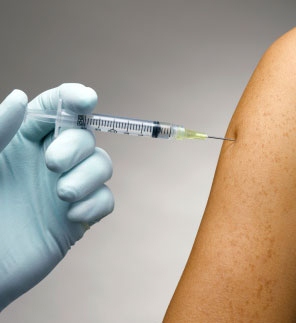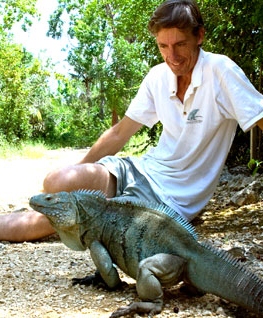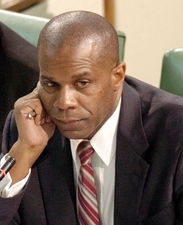Archive for October 18th, 2012

Nurse urges parents to allow girls HPV jab
 (CNS): Although the government’s free vaccination programme for the Human Papillomavirus HPV vaccine is not mandatory, School Health Coordinator Nurse Joanna Rose Wright has urged parents and guardians to allow their young girls take advantage of the vaccine which can protect them from cervical cancer. She said that a letter will be sent home to all parents on 30 October advising of the process and requesting confirmation of consent for the child to be given the vaccination. “No child will be vaccinated without parental consent, and parents will have the opportunity to be present at the time of vaccination if they choose,” she said.
(CNS): Although the government’s free vaccination programme for the Human Papillomavirus HPV vaccine is not mandatory, School Health Coordinator Nurse Joanna Rose Wright has urged parents and guardians to allow their young girls take advantage of the vaccine which can protect them from cervical cancer. She said that a letter will be sent home to all parents on 30 October advising of the process and requesting confirmation of consent for the child to be given the vaccination. “No child will be vaccinated without parental consent, and parents will have the opportunity to be present at the time of vaccination if they choose,” she said.
The letters are to be returned to the child’s school teacher no later than November 1, 2012. Parents are urged to be on the lookout for letters in the school bags of year 7 girls, 11-12 years old.
Announced last month by the the health minister Mark Scotland the cancer prevention vaccine, is being integrated into Cayman’s childhood immunization programme starting in November of this year. To start with the free programme is being offered at the two government high schools, John Gray and Clifton Hunter, beginning the week of November 5 from 10 a.m. to noon.
The target populations for the vaccine are girls aged 11-12 years in year 7 and it involves three injections given by School Nurses over six months — at the time of the appointment; two months after the first dose; and six months after the first dose.
Children between the ages of 11 – 17 from both government and private schools, accompanied by their parents, can also get their HPV vaccination at some Health Services Authority facilities including the Public Health Clinic at the Cayman Islands Hospital, West Bay and Bodden Town health centres, and Faith Hospital in Cayman Brac. Appointments can be made by contacting the health centres.
Further information may be had by calling the Public Health Clinic on 244-2648. West Bay Health Centre on 949-3439; Bodden Town Health Centre on 947-2299; Faith Hospital on 948-2243 and Little Cayman Clinic on 948-0072.

Blues back from brink
 (CNS): The unique Grand Cayman blue iguanas have taken an official step back from the brink of extinction in the updated International Union for Conservation of Nature (IUCN) threatened species list. As a result of the work of Fred Burton and the National Trust’s Blue Iguana Recovery Programme the indigenous iguana which was “critically endangered” is now listed as “endangered.” Burton explained that endangered was probably as good as it would ever get for the iconic creatures because of the incredible pressures on their environment but he said that the programme was very close to reaching the goal of 1000 ‘blues’ living in the wild.
(CNS): The unique Grand Cayman blue iguanas have taken an official step back from the brink of extinction in the updated International Union for Conservation of Nature (IUCN) threatened species list. As a result of the work of Fred Burton and the National Trust’s Blue Iguana Recovery Programme the indigenous iguana which was “critically endangered” is now listed as “endangered.” Burton explained that endangered was probably as good as it would ever get for the iconic creatures because of the incredible pressures on their environment but he said that the programme was very close to reaching the goal of 1000 ‘blues’ living in the wild.
While there are still many other conservation issues and significant numbers of species of flora and fauna in the Cayman Islands under threat, Burton's work demonstrates the possibilities when a commitment is made to conservation.
Although the Grand Cayman Blue Iguana (Cyclura lewisi) is protected by law and there are now reserves set aside for them to live and breed in the wild, with no national conservation law on Cayman’s statute books, the habitat which the blues need to survive outside of the reserves is not protected. As a result ‘blues’ are unlikely to ever go beyond endangered.
“In IUCN Red List terms, Endangered is the best we can ever hope for as far as the Grand Cayman Blue Iguana is concerned,” said Burton,who aside from running the National Trust’s ‘blues’ conservation programme is also a member of the IUCN Species Survival Commission(SSC) Iguana Specialist Group. “Human impacts on Grand Cayman are now so extensive that there just isn’t scope for these iguanas to regain numbers in the tens of thousands. However, we are confident that we will achieve our long term goal of restoring at least 1,000 Grand Cayman Blue Iguanas to the wild,” he added.
The iguana is also threatened by free-roaming dogs and cats as well as by habitat loss so conservation must continue, Burton warned.
The latest update to The IUCN Red List of Threatened Species was released in India this week with the blues revised status. In 2002 there were only about 10 to 25 of them in the wild and as a result the iguana was listed as Critically Endangered but the conservation efforts have paid off and there are now 750 individuals living in the east of the island, resulting in the status change.
The recovery programme involves habitat protection, captive breeding and release, research and monitoring, as well as education and outreach, and is an example of how conservation can work successfully.
Jean-Christophe Vié, Deputy Directory, IUCN Global Species Programme said the recovery programme deserves congratulations as the downlisting of the Grand Cayman Blue Iguana is a fantastic achievement. “When people with dedication and good knowledge are supported, success can be expected and this news will boost the morale of people around the world who are working hard to improve the status of other species,” he said.
View the new Red List assessment of the blue iguanas here.
http://www.iucnredlist.org/details/44275/0

Four catch dengue in Cayman
(CNS): Updated — Government officials have confirmed that four cases of dengue fever have been contracted locally and there could be more. Dr Kiran Kumar, the medical officer of health, said Thursday that of seven recent cases only three had reported a travel history to endemic countries, meaning the remaining cases were contracted here in the Cayman Islands. The senior publichealth expert urged everyone to take precautions against getting bitten but not to panic. The MRCU has stepped up its operations, especially in the West Bay area where the patients that have contracted dengue came from, which the director of the unit said is proving to be effective.
“While there are only a few confirmed cases, there is a possibility that there are some persons with mild dengue symptoms who have not sought medical attention,” he said. “I am therefore requesting that our residents be alert, take preventative measures, and do not panic. The Mosquito Research and Control Unit (MRCU) has been informed of all cases under investigation in order that adequate mosquito control measures can be taken.”
Dr Kumar explained that for the Aedes aegypti mosquito to transmit dengueit must bite an infected person and then bite others. The local mosquitoes are not carrying the disease but have themselves picked up the dengue from an infected individual. “It is essential for everyone toavoid mosquito bites by covering up during the late afternoon when the dengue carrier, the Aedes aegypti mosquito, is at its peak,” Dr Kumar added.
With what may only be a very small number of infected mosquitoes on Grand Cayman responsible for passing on the dengue fever, the MRCU is working hard to ensure that the Aedes aegypti numbers are kept down. The MRCU are focusing their efforts in West Bay in addition to the regular schedule of aerial spraying and misting.
“I want to assure the public that the Mosquito Research & Control Unit has already intensified its efforts in the areas where most of the cases were confirmed, and since Monday included aerial operations, ground spraying, thermal fogging and larviciding, in their operations," said Dr William Petrie, the director at the MRCU.
“Since the first detection of dengue in West Bay, ground control operations have continued on a daily basis, against both larval and adult mosquitoes. All areas around confirmed and suspected Dengue cases have now been treated,” he added.
Work crews have carried out thermal-fogging of a 600 meter radius around the patient's residence and a nearby school was surveyed and treated as well as all yards in the area. Following this initial treatment, MRCU work crews have continued thermal fogging and to date have treated an area of over 400 acres in the Birch Tree Hill area in West Bay.
In addition to thermal fogging and larval control, the area was treated with a truck mounted cold fog sprayer on the evening of 11 October and the morning of 12 October. Aerial control operations, which were added to supplement ground control, began on 15 October once weather and environmental conditions were suitable, the MRCU stated.
Aerial control operations using Mosquito-Mist adulticide spray commenced on 15 October and initial case studies showed the treatment to be effective at killing adult mosquitoes.
Dr. Petrie said MRCU routinely sprays and carries out control operations against the mosquito long before the locally contracted case of Dengue.
“MRCU will maintain control activities in the area to ensure that transmission of the virus has been interrupted. Aerial control operations will continue on a twice weekly basis at 5:0 pm in the West Bay area and the success of these missions will be monitored by cage study trials and monitoring the larval population.
Cayman has had a limited number of locally contracted cases in the past. Officials said that in 2010, there were 61 dengue investigations, resulting in seven confirmed dengue cases, four of whom had no travel history. In 2011, there were 21 investigations, two were confirmed positive, and one of whom had no travel history. As of 12 October this year, 26 cases have been investigated with seven now confirmed; another eight people came up negative and results are pending for the remaining eleven.
So far this year, 17 of 23 Caribbean countries have reported over 1,500 confirmed dengue fever cases. According to the Caribbean Epidemiology Centre (CAREC) Surveillance Report, as of August 2012, Belize, Guyana, Suriname, Jamaica and Curacao account for approximately 87% of the cases reported in the region. Recently, Jamaica reported 1215 suspected dengue cases and five suspected deaths. About half of the suspected dengue cases have occurred in the areas of Kingston and St. Andrew.
Anyone travelling to endemic areas is advised to avoid mosquito bites, and if they develop dengue symptoms within two to three weeks of returning home should consult their physician and tell the doctor about their travel history.
Following news of the four confirmed cases of dengue in Cayman and just ahead of the National Health Conference, Health Minister Mark Scotland said he was pleased that the necessary steps are being taken by the Public Health department and MRCU.
“I encourage every resident to do their part and ensure that all containers and other items that can store water are removed from their yards in order to discourage the breeding of the mosquitoes,” he said.
For more advice on mosquito control, contact MRCU on 949-2557 in Grand Cayman, or 948-2223 in Cayman Brac; and DEH on 949-6696 in Grand Cayman, or 948-2321 in Cayman Brac.
See dengue fever fact sheet below.

Beatle backs call to stop turtle farming in Cayman
 (CNS): One of the world’s most famous musicians, Paul McCartney, has offered his public support to the international campaign being spearheaded by the World Society for the Protection of Animals (WSPA) to stop turtle farming in the Cayman Islands. The former Beatle member announced on his website and ‘tweeted’ his backing for the campaign as he asked his fans to also support the goal to stop the farming and move towards conservation. Meanwhile, the Sea Turtle Conservancy has also joined the WSPA in asking the Cayman Turtle Farm to end the farming and is encouraging members of the public to take action.
(CNS): One of the world’s most famous musicians, Paul McCartney, has offered his public support to the international campaign being spearheaded by the World Society for the Protection of Animals (WSPA) to stop turtle farming in the Cayman Islands. The former Beatle member announced on his website and ‘tweeted’ his backing for the campaign as he asked his fans to also support the goal to stop the farming and move towards conservation. Meanwhile, the Sea Turtle Conservancy has also joined the WSPA in asking the Cayman Turtle Farm to end the farming and is encouraging members of the public to take action.
Tweeting about the campaign on Wednesday, McCartney said there was no humane way to farm sea turtles. “Support @WSPA campaign to #stopseaturtlefarming,” McCartney posted on his Twitter account.
The WPSA’s campaign is attracting worldwide attention and at 2pm on Thursday 46,881 people had signed a petition on the website, which was posted only at the weekend.
A spokesperson for Sea Turtle Conservancy, which is based in the US, said Thursday that it had objected repeatedly to the Cayman Turtle Farm’s release of captive-raised turtles into the wild because of the potential impact on wild populations in the broader Caribbean.
“Well-documented diseases found primarily in captive turtles can be spread to wild populations,” the world's oldest marine turtle research and conservation organization said. “The turtles that are breeding at the Cayman Turtle Farm originate from many different oceans and nesting colonies, which means they have very different genetics. If their offspring are allowed to mix with and mate in the wild, it could have far reaching impacts on sea turtle navigation abilities and genetics.”
The group also said the release programme gives a false impression that conservation can be accomplished simply by breeding turtles in tanks and the releasing them.
“The Cayman Turtle Farm tries to promote its operation as something beneficial to wild turtle populations,” said David Godfrey, Sea Turtle Conservancy Executive Director. “Despite the lack of evidence that the turtle release program actually benefits the wild population, countless individuals around the world are led to believe that the program works and that it is a successful option for saving and restoring wild sea turtle numbers.”
Godfrey also pointed to the recent death of about 300 green turtles at the Farm during the repair of a leaking seawater pipe and said the turtles had been left to die in the heat.
“In essence, once the tank was drained, the turtles were left piled on top of each other to cook to death under the Cayman sunshine,” said Godfrey. “It’s time to turn things around at the Cayman Turtle Farm, and there really is an opportunity to do something positive for sea turtles at this historical site.”
The group said it was joining the World Society for the Protection of Animals in publicly asking the Cayman Turtle Farm to permanently end sea turtle farming and encouraging members of the public to take action at www.stopseaturtlefarm.org
Related articles on CNS:

Labour office teaches business about the law
(CNS): Officials from the new labour department have said that one of its main objectives is to promoting a culture of workplace excellence and as a result has begun hosting training sessions for local businesses into upholding and applying the Labour Law (2011 Revision) when dealing with their employees and work environments. Director of Labour and Pensions Mario Ebanks who facilitated the course and said it was about promoting a culture of workplace excellence and compliance.
“If we can train business managers, owners and HR practitioners to properly understand and apply the Labour Law, we can achieve many things including: improve productivity in the workplace, promote tranquillity and good employer-employee relations, and also reduce the time and expense for all parties with dispute resolution, conciliation, and Labour Tribunal Hearings,” he said. “A good partnership between the Department and the business community is critical, while at the same time being clear as to the Rights of the employee.”
The Fundamentals of the Labour Law one day course was held on 12 September and was atte4nded by business owners and staff members from: Roper’s Enterprises, Phoenix ltd, Mike’s Ice and Refrigeration, Maples and Calder, Grand Caymanian Resort, Prestige Motors, and Larry’s Hardware. The DLP said it will continue to host courses on the Labour Law throughout the rest of the year, with another course planned for both October and November.
Businesses or employees wishing to Register for these courses, or seeking information or training in other areas of Labour or Pensions should contact the Department of Labour & Pensions, located on the 2nd floor of Mid Town Plaza on Elgin Avenue. The department is open to the public from 9:00 a.m. to 4:00 p.m. Monday-Friday; telephone: 945-8960, fax: 945-8961, confidential hotline for labour and pension complaints: 945-3073.

Mac ‘knocking on doors’
 (CNS): Admitting that the premier is travelling in Asia, his office has released a statement with limited details of his latest extended overseas trip. Following criticisms from the opposition about his continued absence and his failure to inform the country where he was and why as well as the neglect of domestic matters, the premier said he was “knocking on doors” in Asia, a “land of expanding economies where investors are looking for new opportunities.” Bush said that no government, including his, could change the economic situation Cayman faces over four years given world conditions, “but we must try,” he said. “In today’s world, that means knocking on doors.”
(CNS): Admitting that the premier is travelling in Asia, his office has released a statement with limited details of his latest extended overseas trip. Following criticisms from the opposition about his continued absence and his failure to inform the country where he was and why as well as the neglect of domestic matters, the premier said he was “knocking on doors” in Asia, a “land of expanding economies where investors are looking for new opportunities.” Bush said that no government, including his, could change the economic situation Cayman faces over four years given world conditions, “but we must try,” he said. “In today’s world, that means knocking on doors.”
In the statement which was not sent to CNS directly from the premier’s office, as is now customary, but forwarded via another source, Bush attempted to justify his travelling as well as that of the deputy premier.
“Every government must travel to conduct business. Whether it’s a lot of travel or little, all depends on the business that has to be conducted. My travels and that of the Deputy Premier don't normally overlap however this time it could not be avoided because of the nature of the meetings, hers for postal matters and mine for finance, both of which had agendas which were set by the international bodies, each in their very different but significant areas of responsibility,” Bush's statement read.
“We have to go to the right places, to knock on the right doors; whether that is to try to stop the EU from forcing us to 'converge' our financial services legislation with theirs, as we have had to go all the way to Greenland to do, or it is to seek the right kind of investment, as I am now doing,” he added.
Blaming the opposition for the financial woes of the country, the premier said he could not bring new opportunities “using the same old strategies that the PPM used,” and as the finance and tourism minister he could not find new business “by sitting down in the Government Administration Building” or “playing dominoes in some bar”.
Although the details of the trip were limited in the statement, as reported on CNS previously, the premier’s office revealed that Bush had been to meetings related to the IMF and World Bank conference, which had taken place in Tokyo. The office also stated that the premier was “pursuing business opportunities” in other places in Asia, including Hong Kong and China.
According to other sources the premier is expected back on 28 October.
The Legislative Assembly will return on 5 November, and addressing the opposition question about the Framework for Fiscal Responsibility — the agreement he has already signed with the UK — and the need to pass it into law, Bush said that it and “any Constitutional matters” would be dealt with in what he called a “manner that is to the benefit of the people” but he did not explain what that meant.
Since the 21 day deadline for any legislation coming before the House at the next meeting has already passed, the premier will not be able to bring the FFR without falling foul of that constitutional requirement.
Meanwhile, CNS has submitted FOI requests regarding the travelling by both the premier and deputy premier, including the destinations, the reasons for the various trips, the delegates that accompanied them and the cost to the public purse. The request has been acknowledged but no information has been released in connection with the request.
See the premier’s full statement below.
Related articles on CNS:

Jamaica watchdog alarmed over CHEC contract
 CNS): Jamaica’s contractor general has expressed alarm over the latest revelations regarding corruption in government over private sector contracts. According to comments in the Jamaican press, attributed to Patrick Wong, the former Chief Executive Officer of the National Works Agency, the government is choosing contractors, and Greg Christie said that, if true, it “depicts a very worrisome state of affairs” for Jamaica’s contracting system.” In a Gleaner article Wong had said that the selection of sub-contractors on the US$400 million mega-contract awarded to China Harbour and Engineering Company (CHEC) was guided by an “unwritten protocol” of political interference.
CNS): Jamaica’s contractor general has expressed alarm over the latest revelations regarding corruption in government over private sector contracts. According to comments in the Jamaican press, attributed to Patrick Wong, the former Chief Executive Officer of the National Works Agency, the government is choosing contractors, and Greg Christie said that, if true, it “depicts a very worrisome state of affairs” for Jamaica’s contracting system.” In a Gleaner article Wong had said that the selection of sub-contractors on the US$400 million mega-contract awarded to China Harbour and Engineering Company (CHEC) was guided by an “unwritten protocol” of political interference.
"The unwritten protocol was established by former Prime Minister P.J. Patterson that MPs must be consulted … The recommendations of the MPs were, therefore, considered in accordance with the unwritten protocol that existed," Wong states in the Gleaner article.
Christie stated that if what Wong has alleged is true it would confirm that there is a “systemic, irregular, widespread and potentially corrupt interference, by politicians, in the disbursement of scarce public financial resources to certain selected works contractors who may be aligned to the said politicians.”
Such an “unwritten protocol” would “significantly undermine the good governance principles of impartiality, fairness, merit, transparency, competition and value for money,” Christie added as he expressed his concerns in a statement Wednesday.
He said it invited the inescapable question as to whether the “protocol” was used to facilitate corruption in the form of ‘kick-backs’ from the selected contractors to the politicians. This, he believed was further evidence of "institutionalized corruption” in the country.
“The fact that a multi-billion dollar state contract, such as the JDIP contract, was awarded without competition to CHEC, which is a foreign contractor, and was then subsequently sub-awarded by CHEC to several local sub-contractors without competition, and outside of the remit of the OCG, should now be cause for concern for all Jamaicans, particularly having regard to Mr Wong’s assertions that the selection of the said sub-contractors was politically inspired and engineered,” he added.
.
This is the same company with which the Cayman Islands government has signed an MOU in connection with a proposal to construct the much anticipated cruise berthing facility in George Town. Although there has been very little information in recent months about the progress on the project, throughout the talks the Cayman premier has stated that CHEC will be sub-contracting local workers for the job and not importing labour.
Related article on CNS:
Mac insists CHEC to do port (29 June 2012)